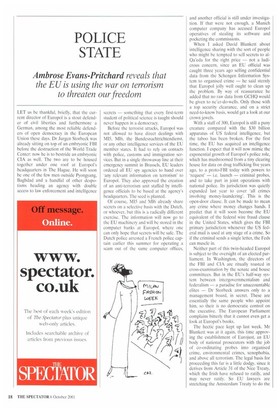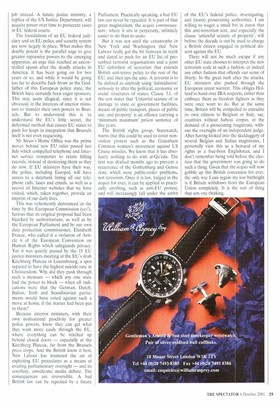POLICE STATE
Ambrose Evans-Pritchard reveals that the EU is using the war on terrorism to threaten our freedom
LET us be thankful. briefly, that the current director of Europol is a stout defender of civil liberties and furthermore a German, among the most reliable defenders of open democracy in the European Union these days. Dr Jurgen Storbeck was already sitting on top of an embryonic FBI before the destruction of the World Trade Center: now he is to bestride an embryonic CIA as well. The two are to be housed together under one roof at Europol's headquarters in The Hague. He will soon be one of the few men outside Pyongyang, Baghdad and a handful of other despotisms heading an agency with double access to law enforcement and intelligence secrets — something that every first-term student of political science is taught should never happen in a democracy.
Before the terrorist attacks, Europol was not allowed to have direct dealings with MI5, MI6, the Bundesnachtrichtendienst, or any other intelligence services of the EU member states. It had to rely on contacts with police, customs and immigration services. But in a single throwaway line at their emergency summit in Brussels, EU leaders ordered all EU spy agencies to hand over any relevant information on terrorism' to Europol. They also approved the creation of an anti-terrorism unit staffed by intelligence officials to be based at the agency's headquarters. The seed is planted.
Of course, MI5 and MI6 already share secrets on a selective basis with the Dutch, or whoever, but this is a radically different exercise. The information will now go to the EU machinery and will be stored in the computer banks at Europol, where one can only hope that secrets will be safe. The Dutch police arrested a French police captain earlier this summer for operating a scam out of the same computer offices, and another official is still under investigation. If that were not enough, a Munich computer company has accused Europol operatives of stealing its software and pocketing the commissions.
When I asked David Blunkett about intelligence sharing with the sort of people who might be tempted to sell secrets to alQa'eda for the right price — not a ludicrous concern, since an EU official was caught three years ago selling confidential data from the Schengen Information System to organised crime — he said sternly that Europol jolly well ought to clean up the problem. By way of reassurance he added that no raw data from GCHQ would be given to ne'er-do-wells. Only those with a top security clearance, and on a strict need-to-know basis, would get a look at our crown jewels.
With a staff of 300, Europol is still a puny creature compared with the $30 billion apparatus of US federal intelligence, but the taboo has been broken, For the first time, the EU has acquired an intelligence function, I expect that it will now mimic the exponential growth of Europol's police role, which has mushroomed from a tiny clearing house for data on drug trafficking five years ago, to a proto-FBI today with powers to 'request' — i.e. launch — criminal probes, and to take part in joint operations with national police. Its jurisdiction was quietly expanded last year to cover 'all crimes involving money-laundering'. This is the open-door clause. It can be made to mean any crime where money changes hands. I predict that it will soon become the EU equivalent of the federal wire fraud clause in the United States, which gives the FBI primary jurisdiction whenever the US federal mail is used at any stage of a crime. So if the criminal sends a single letter, the Feds can muscle in.
Neither part of this twin-headed Europol is subject to the oversight of an elected parliament. In Washington, the directors of the FBI and CIA are ritually toasted in cross-examination by the senate and house committees. But in the EU's half-way system between intergovernmentalism and federalism — a paradise for unaccountable elites — Dr Storbeck answers only to a management board, in secret. These are essentially the same people who appoint him, so their is no democratic control on the executive. The European Parliament complains bitterly that it cannot even get a look at Europol's books.
The hectic pace kept up last week. Mr Blunkett was at it again, this time approving the establishment of Eurojust, an EU body of national prosecutors with the job of co-ordinating probes into organised crime, environmental crimes, xenophobia, and above all terrorism. The legal basis for proceeding this far is a little dodgy, since it derives from Article 31 of the Nice Treaty, which the Irish have refused to ratify, and may never ratify. So EU lawyers are stretching the Amsterdam Treaty to do the
job instead. A future justice ministry, a replica of the US Justice Department, will acquire power over time to prosecute cases in EU federal courts.
The foundations of an EU federal judiciary and an EU police and security system are now largely in place. What makes this doubly potent is the parallel urge to give greater repressive powers to the emerging apparatus, an urge that reached an uncontrolled spasm after the deadly attacks in America. It has been going on for two years or so, and while it would be going too far to describe Jack Straw as the Godfather of this European police state, the British have certainly been eager sponsors. This may seem illogical, since it is not obviously in the interests of interior ministers to transfer their own powers to Brussels. But to understand this is to understand the EU's little secret, the deformed method that causes EU states to push for leaps in integration that Brussels itself is not even requesting.
Mr Straw's Home Office was the prime mover behind new EU rules passed last July which compelled telephone and Internet service companies to retain billing records, instead of destroying them as they do now. If EU ministers have their way, the police, including Europol, will have access to a databank listing all our telephone calls, faxes and emails, as well as a record of Internet websites that we have visited, which, taken together, provide an imprint of our daily lives.
This was vehemently denounced at the time by the European Commission (yes!), furious that its original proposal had been hijacked by authoritarians, as well as by the European Parliament and by our own data protection commissioner, Elizabeth France, who called it a violation of Article 6 of the European Convention on Human Rights which safeguards privacy. Yet it was quietly passed by the 15 EU justice ministers meeting at the ELT's drab Kirchberg Plateau in Luxembourg, a spot reputed to have the highest suicide rate in Christendom. Why did they push through such a measure — which any one state
had the power to block when all indications were that the German, Dutch, Italian, Irish and Scandinavian parliaments would have voted against such a move at home, if the matter had been put to them?
Because interior ministers, with their own institutional proclivity for greater police powers, know they can get what they want more easily through the EU, where everything can be stitched up behind closed doors — especially at the Kirchberg Plateau, far from the Brussels press corps. And the British know it best. New Labour has mastered the art of exploiting EU procedures as a means of evading parliamentary oversight — and its corollary, unwelcome media debate. The consequences are irreversible. A bad British law can be repealed by a future Parliament. Practically speaking, a bad EU law can never be repealed. It is part of that great magisterium, the acquis communaumire, where it sits in perpetuity, infinitely easier to do than to undo.
But it was not until the catastrophe in New York and Washington that New Labour really got the bit between its teeth and dared to push for an EU list of proscribed terrorist organisations and a joint EU definition of terrorism that extends British anti-terror policy to the rest of the EU, and then ups the ante. A terrorist is to be defined as anybody using 'intimidation' seriously to alter the political, economic or social structures of states. Clause 3.f. of the text states that 'Unlawful seizure of or damage to state or government facilities, means of public transport, places of public use, and property' is an offence carrying a 'minimum maximum' prison sentence of five years.
The British rights group, Statewatch, warns that this could be used to cover nonviolent protest such as the Greenham Common women's movement against US Cruise missiles. We know that it has absolutely nothing to do with al-Qa'eda. The text was drafted months ago to prevent a recurrence of the Gothenburg and Genoa riots, which were public-order problems, not terrorism. Once it is law, lodged in the acquis for ever, it can be applied to practically anything, such as anti-EU protest, and will increasingly fall under the ambit of the EU's federal police, investigating, and (soon) prosecuting authorities. I am willing to wager a small bet in euros that this anti-terrorism text, and especially the clause 'unlawful seizure of property', will before the decade is out be used to charge a British citizen engaged in political dissent against the EU.
There will not be much escape if any other EU state chooses to interpret the new terrorism code in such a fashion, or indeed any other fashion that offends our sense of liberty. In the great rush after the attacks, EU ministers also pushed through the European arrest warrant. This obliges Holland to hand over IRA suspects, rather than embrace them as freedom fighters as they were once wont to do. But at the same time, Britain will be compelled to extradite its own citizens to Belgium or Italy, say, countries without habeas corpus, at the demand of a prosecuting magistrate, without the oversight of an independent judge. After having looked into the skulduggery of several Belgian and Italian magistrates, I personally view this as a betrayal of my rights as a free-born Englishman, and I don't remember being told before the election that the government was going to do such a thing. Given that the acquis will now gobble up this British concession for ever, the only way I can regain my lost birthright is if Britain withdraws from the European Union completely. It is the sort of thing that sets one thinking.



































































































 Previous page
Previous page